Inside American Eagle's AI-Driven Logistics Optimization
June 19, 2025

Host Diego Solorzano sits down with Gabriella Runnels, Principal Data Scientist at American Eagle Outfitters, to explore how AEO combines tried-and-true mathematical optimization with cutting-edge AI to solve complex supply chain challenges. Learn how the team built four interconnected apps to slash costs, improve service levels, and even offer these capabilities to smaller brands via Quiet Platforms. Gabriella also shares her philosophy on change management, data quality, and why the future belongs to supply chain professionals who leverage AI without losing human creativity.
Host Diego Solorzano sits down with Gabriella Runnels, Principal Data Scientist at American Eagle Outfitters, to explore how AEO combines tried-and-true mathematical optimization with cutting-edge AI to solve complex supply chain challenges. Learn how the team built four interconnected apps to slash costs, improve service levels, and even offer these capabilities to smaller brands via Quiet Platforms. Gabriella also shares her philosophy on change management, data quality, and why the future belongs to supply chain professionals who leverage AI without losing human creativity.
What you will learn:
- How American Eagle reduced shipments per order from 1.2 to under 1.1, saving millions
- The four-app optimization framework for retail supply chains
- Why combining traditional optimization with AI creates more powerful solutions
- How to handle new product introductions in fashion retail with clustering algorithms and attribute-based forecasting
- The critical importance of data quality and digitization in supply chain optimization
- Why human judgment remains essential in retail
- How shared logistics platforms can help smaller retailers access enterprise-level supply chain capabilities
- The practical approach to change management when implementing AI solutions
Gabriella Runnels is a Principal Data Scientist and Senior Manager of Supply Chain Science at American Eagle Outfitters, where she specializes in building algorithms to solve complex supply chain challenges. With extensive experience in AI and supply chain optimization, she leads the development of innovative solutions, including forecasting, assortment planning, and dynamic inventory management applications. At American Eagle, she has helped reduce shipments per order from 1.2 to under 1.1 and decreased average package delivery distances by approximately 100 miles by implementing advanced analytics and AI solutions.
Key Highlights:
- 07:55 Integrated Supply Chain Apps for Inventory Optimization
American Eagle's four-app system (forecasting, assortment, dynamic carton routing, and transfer) works together to optimize inventory across their network. The forecasting app predicts demand by location and SKU, while the assortment app determines optimal product placement to minimize delivery costs and prevent stockouts. For new products, they use clustering algorithms to associate them with similar historical items, enabling accurate forecasting from day one. This integrated approach has helped reduce shipments per order from 1.2 to 1.1, saving millions in delivery costs.
- 14:40 Product Affinity Analysis for Efficient Order Fulfillment
American Eagle's assortment app analyzes product relationships to optimize inventory placement and reduce split shipments. The system identifies items frequently purchased together, such as bikini tops and bottoms, or jeans and shorts, ensuring complementary products are stocked in the same location. This approach has reduced average shipping distance by 100 miles per package and significantly improved delivery times. The technology considers both obvious and non-obvious product relationships to maximize efficiency.
- 21:21 Change Management Strategy for AI Implementation
Gabriella emphasizes the importance of humility and collaboration when implementing AI solutions in supply chain operations. Rather than positioning AI as a replacement for human workers, the focus should be on creating tools that empower employees to work more effectively. Success requires understanding existing processes and KPIs from those who know them best, while avoiding jumping to AI solutions without fully understanding the problem. Building trust and relationships proves more valuable than technical expertise alone.
- 27:07 Data Foundation for Supply Chain Innovation
The key to successful supply chain optimization lies in developing a robust data infrastructure before implementing advanced AI solutions. Organizations must focus on digitalizing manual processes and capturing institutional knowledge that often exists only in employees' heads or scattered across emails and spreadsheets. Clean, well-documented data enables more effective modeling and optimization strategies. While not glamorous, this foundational work is essential for any meaningful supply chain transformation.
Episode Resources:
Supply Chain Optimizers is handcrafted by our friends over at: fame.so